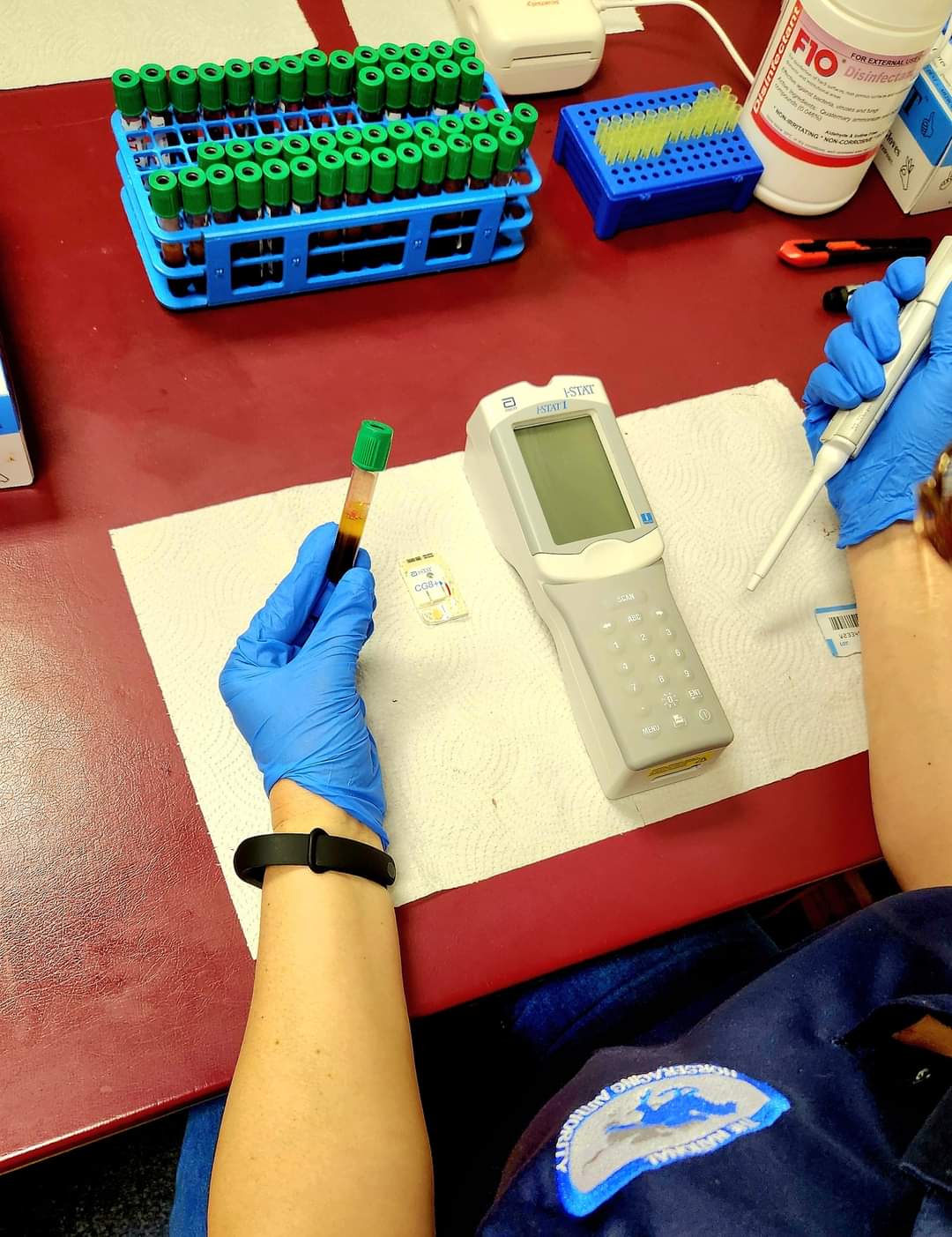
𝗙𝗼𝗿 𝘁𝗵𝗲 𝗳𝗶𝗿𝘀𝘁 𝘁𝗶𝗺𝗲 𝗶𝗻 𝗦𝗼𝘂𝘁𝗵 𝗔𝗳𝗿𝗶𝗰𝗮, 𝗮 𝗵𝗼𝗿𝘀𝗲 𝘄𝗮𝘀 𝘀𝗰𝗿𝗮𝘁𝗰𝗵𝗲𝗱 𝗳𝗿𝗼𝗺 𝗮 𝗿𝗮𝗰𝗲 𝗳𝗼𝗿 "𝗲𝗹𝗲𝘃𝗮𝘁𝗲𝗱 𝗽𝗿𝗲-𝗿𝗮𝗰𝗲 𝗧𝗖𝗢𝟮 𝗹𝗲𝘃𝗲𝗹𝘀" 𝗮𝘁 𝗧𝘂𝗿𝗳𝗳𝗼𝗻𝘁𝗲𝗶𝗻 𝗥𝗮𝗰𝗲𝗰𝗼𝘂𝗿𝘀𝗲 𝗼𝗻 𝗦𝗮𝘁𝘂𝗿𝗱𝗮𝘆 𝟲 𝗔𝗽𝗿𝗶𝗹 𝟮𝟬𝟮𝟰, 𝘄𝗵𝗲𝗻 𝗣𝗿𝗶𝗺𝗲 𝗘𝘅𝗮𝗺𝗽𝗹𝗲 (𝗧 𝗭𝗮𝗰𝗸𝗲𝘆) 𝘄𝗮𝘀 𝘀𝗰𝗿𝗮𝘁𝗰𝗵𝗲𝗱 𝗯𝗲𝗳𝗼𝗿𝗲 𝘁𝗵𝗲 𝗿𝘂𝗻𝗻𝗶𝗻𝗴 𝗼𝗳 𝗥𝗮𝗰𝗲 𝟭𝟬. A total of 55 horses were tested before they raced on Saturday at Turffontein and all, bar Prime Example in Race 10, were found to have blood TCO2 levels below the accepted published threshold of 36.0 mmol/L.
While the NHA has been testing pre-race TCO2 levels in randomly selected runners on racedays for some time now, a new testing procedure was recently implemented by the NHA. All stakeholders in the South African Raing Industry were notified of the new procedure and reminded of the accepted thresholds of TCO2 levels via a General Notice, on 15 March 2024, which can be viewed on our website. The new procedure allows for the immediate analysis of any pre-race blood samples, before any of the horses from which the specimens are collected, participate in the races they have been carded to run in.
𝗪𝗵𝗮𝘁 𝗱𝗼𝗲𝘀 𝘁𝗵𝗲 𝗻𝗲𝘄 𝘁𝗲𝘀𝘁𝗶𝗻𝗴 𝗽𝗿𝗼𝗰𝗲𝗱𝘂𝗿𝗲 𝗲𝗻𝘁𝗮𝗶𝗹?
Trainers will be officially notified, on racedays, as to which of their runners need to be presented for the collection pre-race blood specimens. Should a Trainer refuse to allow a blood specimen to be taken, the horse in question will be scratched, as per Rule 75.3.2. The blood specimen will be collected 50 minutes prior to the start of the race the horse is carded to run in, and it will be analysed immediately. Should the analysis of the specimen show that the horse has a TCO2 concentration of more than 35.0 mmol/L, a second blood specimen will be collected, between 10 and 15 minutes later. If the TCO2 concentration of the second blood specimen is 𝗺𝗼𝗿𝗲 𝘁𝗵𝗮𝗻 𝟯𝟲.𝟬 𝗺𝗺𝗼𝗹/𝗟, the Stewards will scratch the horse from the race it is carded to run in and detain that horse for additional specimen collection. Under these circumstances, a third blood specimen will be collected 30 minutes later. If the TCO2 concentration of that third specimen is less than, or equal to, the international threshold of 36.0 mmol/L, no penalty shall be imposed on the Trainer. The horse in question may also have further specimens taken for the full analytical testing of all Prohibited Substances.
𝗪𝗵𝘆 𝗶𝘀 𝘁𝗵𝗲 𝗡𝗛𝗔 𝗱𝗼𝗶𝗻𝗴 𝗶𝗻𝘀𝘁𝗮𝗻𝘁 𝗽𝗿𝗲-𝗿𝗮𝗰𝗲 𝗯𝗹𝗼𝗼𝗱 𝘁𝗲𝘀𝘁𝘀 𝗳𝗼𝗿 𝗧𝗖𝗢𝟮 𝗹𝗲𝘃𝗲𝗹𝘀?
The pre-race administration of alkalinising agents before a race is of concern to racing authorities across the world, because the resulting alkalosis of the horse’s system may enhance performance and could interfere with the detection of any Prohibited Substances in post-race urine samples. The pre-race administration of sodium bicarbonate to a horse running in a race is a practice widely known as “milkshaking”. It is thought by some that giving this treatment, either by oral route or via a naso-gastric tube between 3 to 5 hours prior to a horse running in a race, that the horse’s perfomance may be enhanced, due to increasing the blood buffering capacity and enhancing the clearance of lactate from the muscles, delaying the onset of fatigue in a horse during strenuous activity. The ingestion of sodium bicarbonate in the hours immediately prior to strenuous activity or vigourous exercise maintains blood pH, by acting as a buffer, thus preventing metabolic acidosis. For this reason, the administration of sodium bicarbonate in the hours prior to racing, is generally viewed as performance enhancing. The International Federation of Horseracing Authorities (IFHA) has determined that the threshold limit for pre-race blood TCO2 levels is 36.0 mmol/L and anything above that, regardless of cause, will be a violation of both IFHA and NHA Rules.
𝗦𝘁𝗲𝘄𝗮𝗿𝗱𝘀 𝗥𝗲𝗽𝗼𝗿𝘁 𝗿𝗲𝗴𝗮𝗿𝗱𝗶𝗻𝗴 𝘁𝗵𝗲 𝘀𝗰𝗿𝗮𝘁𝗰𝗵𝗶𝗻𝗴 𝗼𝗳 𝘁𝗵𝗲 𝗵𝗼𝗿𝘀𝗲 𝗣𝗿𝗶𝗺𝗲 𝗘𝘅𝗮𝗺𝗽𝗹𝗲:
𝟲 𝗔𝗽𝗿𝗶𝗹 𝟮𝟬𝟮𝟰 : 𝗧𝘂𝗿𝗳𝗳𝗼𝗻𝘁𝗲𝗶𝗻 : 𝗥𝗮𝗰𝗲 𝟭𝟬 :
𝗦𝗖𝗥𝗔𝗧𝗖𝗛𝗘𝗗:
a) PRIME EXAMPLE was selected for the taking of specimens (TCO2) testing.
The initial specimen, which was tested at 16H19, revealed a reading above 35 TCO2
mmol/L. Trainer Zackey was interviewed and advised that, in terms of the Procedure for Total Carbon Dioxide (TCO2) analysis on Raceday, a second blood specimen would be taken and if this specimen confirmed a level of more than 36.0 mmol/L, PRIME EXAMPLE would be withdrawn from its race. During the interval between Races 9 and 10, Trainer T Zackey was interviewed again and was informed that the second blood specimen had confirmed a level of above the international threshold of 36 mmol/L and that consequently PRIME EXAMPLE would be scratched from this race in terms of the provisions of Rules 72.1.23; 4.2.14 and 4.2.18.
NHA
|